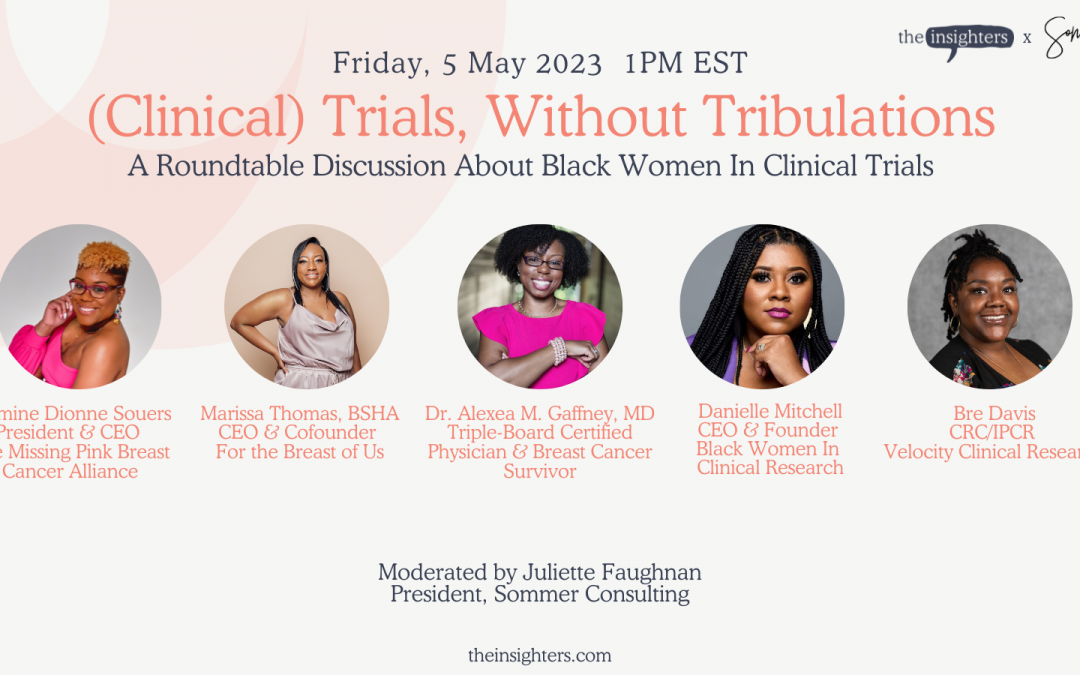Black Women Championing Change in Clinical Trials
With Clinical Trials Day taking place on May 20th, Sommer Consulting recently hosted an esteemed panel of Black women involved with medical research – (Clinical) Trials Without Tribulations. The panel, which included both patient advocates and researchers, discussed their experiences with and perspectives on clinical trials as Black women.
Three themes emerged during the conversation as critical considerations when thinking about the journey of Black women in clinical trials – 1) representation matters, 2) the need to start conversations sooner, and 3) the necessity of addressing historic abuse of Black people by the medical establishment.
Representation Matters
The speakers discussed the importance of representation and diversity in clinical trials, particularly in terms of increasing participation and access to trials for underrepresented communities. Lack of representation of Black people in clinical trials is prevalent and far-reaching. Fewer than 2% of clinical trials funded by the National Cancer Institute, for instance, have met diversity goals. Four out of five participants in cancer clinical trials are white. This imbalance endures despite the 1993 Revitalization Act, which requires prioritizing the inclusion of people of color in federally funded trials.
“It’s important…to see people who look like you,” said Danielle Mitchell, CEO and Founder of Black Women in Clinical Research. “You have to bring those experiences to the table and it’s really essential for promoting equity and addressing health disparities in clinical research…There is a sense of relief and understanding that you have when you see someone who looks like you [as your doctor or in a clinical trial. Someone] who understands your challenges.”
Dr. Alexea Gaffney, a triple-board certified physician and breast cancer survivor, agreed, explaining that there is often a pragmatic reason for feeling that way. She shared that “recent data just came out that when there’s a Black doctor in the community, or when Black people are taken care of by Black doctors, they live longer, and they have better outcomes. We know this to be true for Black infants as well, and so it’s hard not to imagine that that would be the case when we’re talking about clinical trials.”
President and CEO of The Missing Pink Breast Cancer Alliance, Jasmine Dionne Souers, proposed that this is why it is so important that policies and procedures and not feelings drive equity. However, she emphasized that the most important factor in building trust is for healthcare providers, regardless of their race, to listen to their patients and communicate with them respectfully. She explained that providers should remain responsible and duty-bound to provide optimal care and not feel ineffectual if they are caring for Black patients even if they are not themselves Black.
The Need to Start Conversations Sooner
The panel proposed that the lack of representation of Black women both working in and participating as subjects in clinical research is partly linked to the fact that conversations about clinical trials are not occurring frequently or early enough with them. They contend that early conversations encourage them to ask questions, explore ideas, talk to others, and educate themselves about clinical trials, which ultimately drives community members to consider participating and working in clinical research.
Presenting Clinical Trials as Treatment Options
Marissa Thomas, CEO and Co-Founder of For the Breast of Us, observed that many physicians who treat members of the Black community never discuss clinical trials with them as potential treatment options to consider. As a patient, she wondered how one is supposed to get involved in a clinical trial when one may not even know enough about them to ask. She also pointed out that when clinical trials are offered, they often are framed as last resorts when patients are already failing treatments.
Talking about conditions such as cancer in the community needs to be “an ongoing conversation,” Dr. Gaffney said. “It can’t wait until the disease has happened…We get it [breast cancer] younger. We get diagnosed at later stages. We’re more likely to die and to have more aggressive forms of cancer…We cannot wait until the disease has landed to put all of this on a patient to understand.”
In fact, Black women are 30% to 70% more likely to be diagnosed with later stage breast cancer than white women according to Breastcancer.org. Black women are also 42% more likely to die from cancer than white women, according to the American Cancer Society.
Talking About Clinical Research as a Career
Bre Davis, Clinical Research Coordinator and member of the Investigational Product Review Committee at Velocity Clinical Research agreed that it is critical to educate the community about diseases and clinical trials. She said it is important to discuss clinical trials both as treatment options and as a career to consider when thinking about entering the workforce.
“Conversations about clinical trials need to start sooner with middle school and high school [students],” Bre Davis noted. “I didn’t know anything about clinical research in my undergrad years, and had I known about it, I probably would have pursued a different degree, and probably would have gone to grad school for a different masters, and I would have started my career in clinical research earlier. But again, I didn’t have anyone who looked like me to talk about the clinical trials.”
This is why Danielle Mitchell started Black Women in Clinical Research (BWICR) in 2019. BWICR is a network for Black women to connect and share knowledge in the clinical research industry. Its mission is to educate, empower, support, and help Black women like Bre Davis thrive in the clinical research industry.
Addressing Historical Medical Mistreatment in the Black Community
The panel pointed to historical and systemic barriers preventing certain communities from participating in clinical research as another reason for the lack of diversity seen in clinical trials. Any discussion about clinical research needs to address “the elephant in the room,” the panel agreed, referring to the historic abuse of Black people by the medical community (e.g., the Tuskegee Syphilis Study, Henrietta Lacks, etc.).
“I don’t think you should be talking to a person of color about clinical trials without addressing the medical mistrust,” Dr. Gaffney stated. “I think it shows compassion and care and concern. It shows that you’re educated in the history of what has happened to Black people in this country and that you’re interested in addressing that and keeping clinical trial participants safe. So, I think it must be brought up in these spaces and in these conversations.”
Danielle Mitchell agreed, adding that the community “will tell you exactly what their fears are. They will be very open with you, and honest. So, when I was in this community setting, people told me, ‘I don’t want to be a guinea pig. I know about Henrietta Lacks. I know about the Tuskegee syphilis study.’ So, you have to be prepared to answer these questions and let people know that yes, this is what happened in the past, but we have rules and regulations now so in the future this will not happen. And for them to see someone who looks like them telling them this eased a lot of [concerns].”
Creating Credible Solutions through Collaboration & Community Engagement
The panel agreed that the best way to achieve greater representation and ensure that conversations within the community about clinical trials are taking place sooner is “by putting boots on the ground.” Marissa Thomas suggested that clinical trial sponsors should partner with the patient advocates and organizations that are doing the work at the community level. The panel reasoned that collaboration across diverse perspectives and opinions can engage the community in dialogue sooner and lead to better solutions and more flexible strategies for increasing representation of Black women in clinical trials, both in careers and as participants.
Not only is enhancing diversity, equity, and inclusion in clinical trials good practice, but it is mandated by law. The DEPICT Act (Public Law 117-164) that Congress enacted late in 2022 requires that clinical trial sponsors submit diversity action plans to the FDA for use in deciding whether to approve a medical product.
“For a while we have been looking at requirements as a nice to have and not a must have,” observed Jasmine Souers. “I really think that switch will make all the difference. However, having the requirement that is a ‘must have’ means if we are not very strategic and intentional about addressing those barriers, we then create barriers to research, not just participation in clinical trials,” Jasmine Souers cautioned.
You can watch the full recording of the (Clinical) Trials Without Tribulations webinar by clicking here.
Bill Stone
Director, Content Strategy

